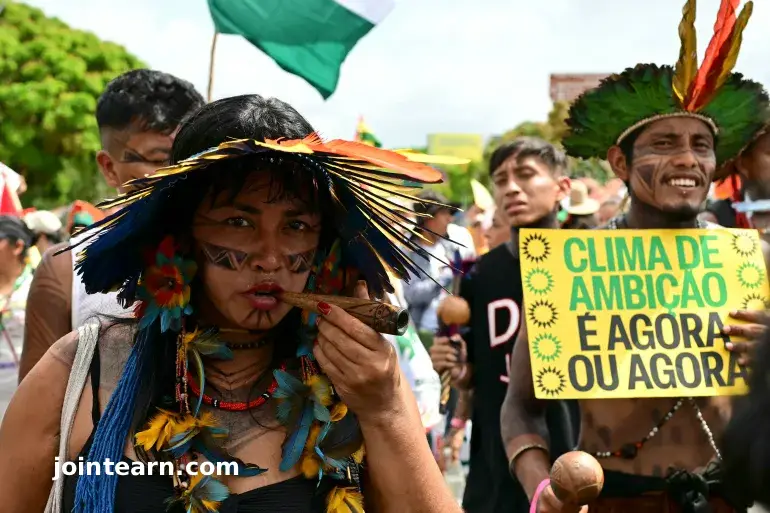
Introduction: Voices Rise at COP30
Thousands of people took to the streets of Belem, Brazil, on November 15, 2025, demanding stronger action on climate change at the COP30 United Nations Climate Change Conference. Branded as the “Great People’s March”, the rally brought together Indigenous communities, youth activists, and environmental defenders calling for urgent measures to protect the Amazon and global ecosystems.
Organizers emphasized the importance of making Indigenous voices heard, highlighting the disproportionate impact of climate change and fossil fuel expansion on native populations. Participants carried symbolic items, including a giant beach ball representing the Earth and a Brazilian flag emblazoned with the words “Protected Amazon”, reflecting their call for action.
Indigenous Activism Takes Center Stage
Indigenous leaders have been at the forefront of COP30 protests, repeatedly pressing the Brazilian government and global leaders to safeguard their territories. Earlier in the week, Indigenous activists stormed the summit, demanding that President Luiz Inácio Lula da Silva take concrete steps to halt deforestation and other threats to their lands.
Benedito Huni Kuin, a 50-year-old leader of the Huni Kuin Indigenous group, told AFP:
“Today we are witnessing a massacre as our forest is being destroyed. We want to make our voices heard from the Amazon and demand results. We need more Indigenous representatives at COP to defend our rights.”
The march served as a high-profile reminder of the urgent need for Indigenous inclusion in climate decision-making, particularly as negotiations at COP30 approach their halfway point.
Youth and Global Activists Join the Call
Youth leaders and climate activists from around Brazil joined the Great People’s March, emphasizing the urgency of global climate action. Ana Heloisa Alves, 27, described the rally as the largest climate march she had ever attended, noting:
“This is incredible. You can’t ignore all these people.”
The festive yet resolute atmosphere highlighted the growing grassroots momentum pushing governments to address the climate crisis, particularly in vulnerable regions such as the Amazon rainforest.
Fossil Fuel Expansion Threatens Billions
The march coincides with mounting evidence that the world’s reliance on fossil fuels poses a critical threat to billions of lives. A recent Amnesty International report warns that projects like oil-and-gas pipelines, coal mines, and other extractive ventures disproportionately affect Indigenous communities, leaving them on the front lines of environmental destruction.
Activists at COP30 have called for immediate measures to curb fossil fuel expansion and accelerate the transition to renewable energy. Their demands are underpinned by the UN’s warnings earlier this month that global warming is on track to exceed the 1.5°C target established under the Paris Agreement, potentially rising 2.3 to 2.5°C by 2100 if current national commitments are fully implemented.
COP30: Urgency Amid Geopolitical Challenges
Despite the dramatic protests and growing public pressure, analysts caution that major new agreements may not emerge from COP30, which concludes on November 21. However, participants hope for progress on previous commitments, particularly funding for vulnerable countries to adapt to climate change.
Inger Andersen, chief of the UN Environment Programme (UNEP), highlighted the urgency:
“While national climate plans have delivered some progress, it is nowhere near fast enough. We still need unprecedented emissions cuts in an increasingly tight window, with an increasingly challenging geopolitical backdrop.”
The Amazon and Global Climate Frontlines
The Great People’s March symbolizes broader global demands for environmental justice and action. With the Amazon rainforest facing deforestation, fires, and industrial encroachment, Indigenous communities are emphasizing the dual importance of protecting local ecosystems and meeting global climate targets.
Activists hope that such demonstrations will amplify their voices, ensuring that Indigenous knowledge, conservation priorities, and environmental rights are incorporated into international agreements at COP30 and beyond.
Conclusion: Mobilizing for Climate Justice
As COP30 continues, marches like the one in Belem, Brazil, underscore the critical role of civil society, youth, and Indigenous leadership in shaping climate policy. The rally exemplifies a growing global movement demanding urgent action on fossil fuel reduction, forest protection, and equitable climate solutions.
The “Great People’s March” is not only a call for immediate policy changes but also a testament to the resilience and determination of communities who are fighting to protect the planet for future generations.


Leave a Reply